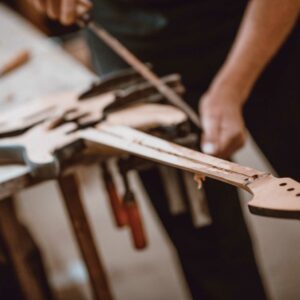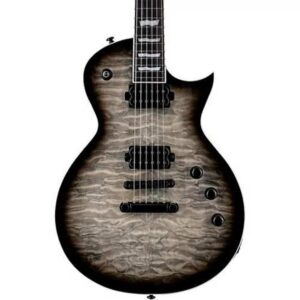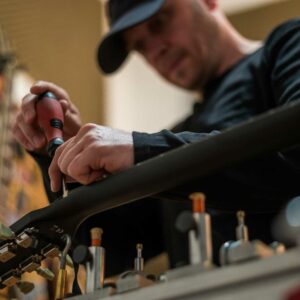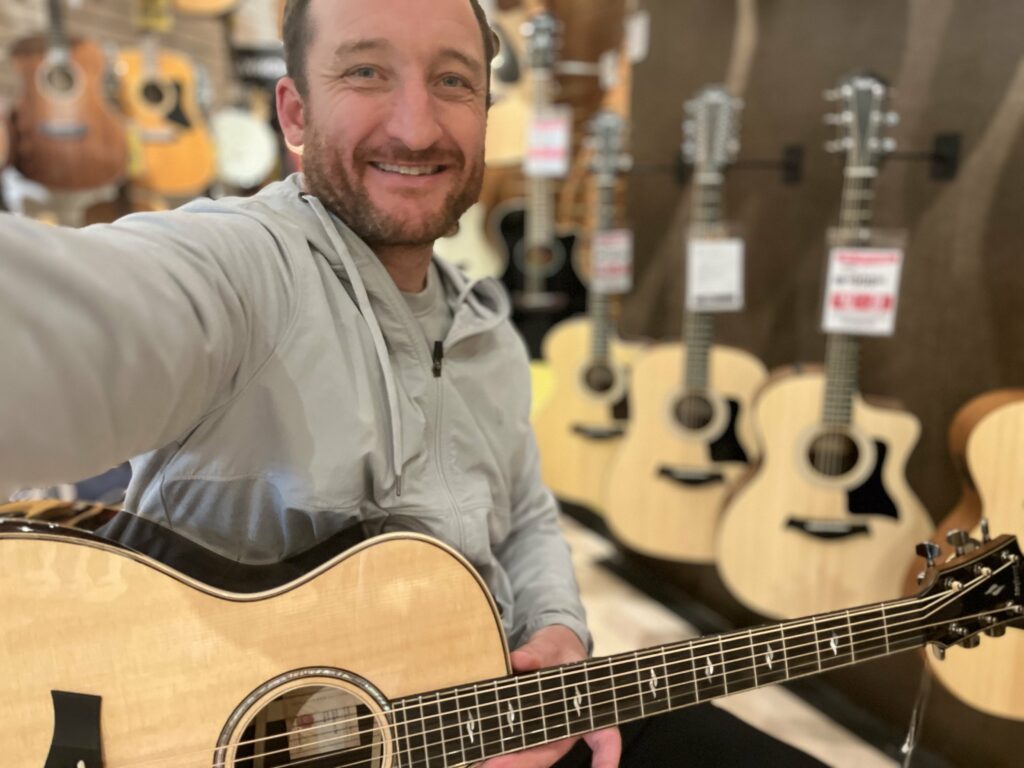So you want to buy an electric guitar but are unsure what is a reasonable price to pay for your skill level?
Well, you’re in the right place as this article will answer the question “how much does an electric guitar cost in 2024?” so you can be sure that you know what to look for in a guitar and know what price range makes the most sense for you.
Read on for everything from budget options perfect for newbies to higher-end tiers suited for more advanced musicians.
Let’s get started!
The Electric Guitar Cost by Quality Tiers
You can break down a guitar’s cost into five tiers:
- Entry Level Bundles ($150-$400)
- Intermediate Guitars ($400-$800)
- Advanced Guitars ($800-$1,500)
- Professional Guitars ($1,500+)
- Custom Shop (Sky’s the limit)
These price points each have their strengths and weaknesses, and I wouldn’t say the guitars get exponentially better as you move up in price.
There is a law of diminishing returns as you enter into the Professional Guitar range. Most advanced player’s sweet spot is in the Intermediate to Advanced range.
Now let’s break down each tier so you can better understand which one you should be shopping in.
Entry Level Guitar Bundles ($150-$400)
Electric guitar starter kits are what 99% of beginners will choose when first embarking on learning the electric guitar. The starter kits come bundled with everything you need to get up and running and are incredibly convenient and budget-friendly.
The challenge with entry-level bundles is usually the included items, like the guitar or amp, are low-quality. It’s good enough to learn, but you will likely upgrade every component of the bundle as you grow in your skills.
A word to the wise, I’d stay away from off-brand beginner electric guitars from Amazon and go with a recognized name brand. Fender, Epiphone, and Yamaha make some incredible value bundles that will be a much better investment, even if it costs you a few extra dollars.
When buying a name brand, you will have an easier time reselling it if you find out that playing guitar isn’t right for you.
Intermediate Guitars ($400-$800)
This price range is where you can find a great electric guitar, no matter your skill level. Intermediate guitars cost $400-$800 and have all the most popular electric guitar models, like a Fender Stratocaster, Epiphone Les Paul, Epiphone Casino, and more.
Often the instruments in this price range will be non-USA built in places like Mexico, China, Indonesia, or South Korea. However, don’t let this deter you from thinking that the quality of these instruments will be bad.
Guitar manufacturing has come a long way. These areas can mass-produce high-quality instruments that play great while keeping the guitar cost down. You will often need a professional setup to maximize the playability and intonation (tuning stability) with a guitar in this price range. This generally costs around $100, but if you are good with working with your hands, you could learn how to do a basic setup yourself.
Another popular thing to do is to swap out pickups on more budget-friendly intermediate guitars. Electric guitar pickups are one of the most critical factors regarding the instrument’s tone. You can get a lot of mileage from your purchase if you swap them for higher-quality ones.
Ultimately, you can find a fantastic instrument at this price range that you can play for years to come.
Advanced Guitars ($800-$1,500)
The advanced guitar is where you begin to expect near perfection in your instrument. You begin to find USA-Made guitars at the upper end of this price point and electric guitars that have more premium components, unique design features, and catered to experienced players.
I think the $1,000-$1,500 price range is where many guitar brands offer experimental designs and unique perspectives on older, more popular designs. This is most prevalent with Fender guitars, where they add a lineup of guitars in this range that always temp to take your money every year.
The one challenge with electric guitars in this range is you start to get into the professional guitars range, where you get much more options for USA-made guitars from all the popular guitar brands. So some may feel like saving a few extra dollars to jump to the next class is a better investment.
This will be up to what you’re looking for from your guitar and if USA-made is an important criterion for your musical instruments.
Professional Guitars ($1,500+)
You’re investing in a “forever” guitar at this price range. Professional electric guitars have the highest quality materials and components available on the market. The electronics, build quality, and construction should be flawless in this price range.
You’ll often notice superior acoustic properties (try strumming an $800 guitar next to a $2000 one unplugged from an amp). Guitars in this price range will come with a hardshell case. It’s crazy to me how many >$1,500 electric guitars only come with a gig bag.
When electric guitars cost over $2,000, you often keep this as your at-home guitar and recording studio guitar. You will want something reliable and easy to work on and maintain when gigging. The last thing you want is to bring out your new “baby” and expose it to the rigors of the road.
It’s also worth mentioning that the law of diminishing returns plays a massive factor in this price range. If an electric guitar cost $1,000 compared to $3,000, is it $2,000 better sounding and playing? No.
You’re paying for many “intangibles” that may only make sense to the person buying the guitar at this price range. You can purchase plenty of fantastic electric guitars at more affordable prices. Still, if you’ve dedicated years to learning guitar and feel like spoiling yourself, go for it; you’ve earned it!
Custom Shop Guitars ($$$$)
Custom shop guitars can be as expensive as you want them to be. You’re paying for the best materials, top-of-the-line craftsmanship, and often one-of-a-kind guitars or limited runs.
Custom shop guitars can range from a few thousand to tens of thousands (or even more). These expensive guitars are not for most guitar players. You should know what you’re looking for in a guitar before even considering purchasing one.
What Makes an Electric Guitar Expensive or Affordable?
There are tons of factors that go into the cost of a guitar. Let’s break down some of the most common factors so you can know when and where to save money or splurge if you want to treat yourself.
Brand
The guitar brand will significantly affect an electric guitar’s cost. Suppose you want to purchase a new Fender Telecaster. Depending on which model you get, you often could find a non-Fender telecaster for less money and equal quality.
The same can be said for a Gibson Les Paul and Fender Stratocaster, two of the most popular guitars.
If you’re looking at beginner guitars, you’ll see many more no-name electric guitars. Stay away from these and go with a more established brand to ensure you get a decent guitar for learning.
At higher price points, going with a less-established brand can save you money and get you a fantastic instrument.
Where it’s Manufactured
Where the electric guitar is made will also affect its cost. USA-made guitars are often more expensive than those made overseas. However, it would be best if you didn’t get too hung up on where your guitar is made.
Some excellent guitars are made in Mexico, South Korea, Japan, China, and Indonesia. Suppose you are buying a guitar in the intermediate to advanced price range. In that case, you most likely are getting an overseas-manufactured electric guitar. You may be surprised to see how little difference there is practically between a USA-made and overseas guitar.
On the flip side, some of the best guitars in the world are made overseas. Electric guitars made in Japan have an excellent reputation among players, often because of their craftsmanship and attention to detail. Don’t hesitate to buy a guitar from another country — it could be your next favorite instrument and not cost an arm and a leg.
How it’s Manufactured

The manufacturing process of an electric guitar will also affect its cost. Many guitars feature CNC-machined parts and are mass-produced, while others may be handmade by a luthier.
Handmade guitars tend to have better attention to detail and playability than their mass-produced counterparts.
Hardware & Electronics
The level of detail that goes into the soldering and electronics, as well as, what is used for the bridge, knobs, nuts, pickups, and tuner pegs, will influence the price of your electric guitar.
Generally speaking, the better the bridge and nut, the better the tuning stability, intonation, and overall tone. Cheaper bridges can also have rattles and other funky sounds that distract from the instrument’s acoustic properties. While this may not be heard when amplified, it can be annoying.
Also, when you take a peak at the inside of the guitar, you’ll usually notice higher-quality electrical components and cleaner soldering. I’ve experienced in more affordable guitars “scratchy” pots, and the pickup selector switches not being functional, to name a few problems you may encounter.
This will have an effect on the overall playability and tone of the instrument.
Tonewoods

While tonewoods don’t have as much of an impact on the overall tone of an electric guitar compared to an acoustic guitar, the types of wood used will affect the price.
A popular tonewood to use for electric guitars is maple. Maple has many different and beautiful types of grain patterns. Specific patterns, like quilted, can bring the cost up, even if it doesn’t make much difference in the playability and tone.
Popular tonewoods, such as Brazilian Rosewood, used to be extremely popular fingerboard materials. However, due to being overharvested, it’s illegal to use Brazilian Rosewood unless the tree has fallen naturally or the wood was harvested before 1992.
Because this wood is rare, it makes electric guitars cost more. Whether or not there is a considerable difference between Brazilian Rosewood and another more sustainable fingerboard material is up to the player. But be aware that sometimes you’re paying for exclusivity rather than playability and quality of construction.
Customizations
The cost of your electric guitar can also be affected by customizations you may add. Electronic upgrades and other modifications may bump up the price of your instrument.
Often when you purchase an electric guitar through an online vendor, like Sweetwater, they will upsell you on customizations you can make to upgrade your instrument. These upgrades could include a better nut, bridge, or volume and tone knobs.
Setup

Getting a professional setup is often wise if you purchase beginner or used electric guitars. A setup can help smooth out any problems or oversights from manufacturers and ensure that your guitar sounds as good as it can.
A professional setup will cost around $100, so consider this cost when shopping for the right electric guitar.
Availability
Depending on what region of the world you live in and what brand of guitar you’re looking at, you may pay more than someone else who lives in the same country that manufactures the electric guitar.
For example, if you want to purchase a Gibson Les Paul in England, you will pay more than if you were in the United States. This is because Gibson has exclusive pricing structures in different countries.
Also, limited edition guitars and guitars manufactured from specific years may be more expensive due to their rarity and status as collectible instruments.
FAQ
Are acoustic guitars more expensive than electric guitars?
Yes and no. Because electric guitars need an amp and cables, beginner electric guitars are often more expensive than acoustic guitars.
However, the tone quality difference between a cheap and expensive acoustic guitar is far more significant than that of a cheap vs. expensive electric.
How much should I spend on a beginner electric guitar?
When purchasing your first beginner guitar, you should consider a bundle from a known brand like Squier by Fender or Yamaha. These bundles are around $200-$350 and will come with everything you need to start.
How much should I budget for an electric guitar?
Electric guitars range in price from under $100 to over $10,000. It depends on what you’re looking for and how much you want to spend.
If you’re starting, I recommend a beginner guitar bundle for around $200-$400. I recommend electric guitars for intermediate players in the $400-$800.
Is it worth investing in a more expensive guitar?
Yes and no. It depends on what you’re looking for in an electric guitar. Investing in a more expensive guitar can be beneficial if you need the highest quality construction, unique styles, and sound.
But if you want something to practice with or take on the road, a more affordable guitar may be exactly what you’re looking for.
Ultimately, it comes down to what you need and how much you’re willing to invest. Consider your budget, playing style, and the features that are important to you before making a purchase.
Are there any deals and discounts on electric guitars?
All the time. You can shop vendors like Guitar Center, Sweetwater, and Musicians Friend to see their monthly deals and promotions. Sometimes you can get screaming deals if you stay on top of it.
Are there any hidden fees or additional costs when purchasing an electric guitar?
The hidden fees of the electric guitar come down to amps, pedals, chords, and other accessories. Unlike an acoustic guitar, you rely on these other gear pieces to get the most out of your purchase.
Another hidden cost can be needing a professional setup to ensure your new guitar plays its absolute best.
Should I purchase a used guitar instead of a brand new one?
Purchasing a used electric guitar can be a great way to get a high-quality instrument at a discounted price. Also, if you’re looking for guitar models built in specific years, you’ll have to buy used ones.
However, you should always inspect the guitar’s condition and have it professionally set up before playing it.
Whether you purchase brand new or used, I recommend buying from trusted brands and retailers.
Ultimately, the decision comes down to personal preference and budget. If you can afford it, buying a brand-new electric guitar is ideal for peace of mind. But a used guitar may be the better option if you want to save money. Be sure to do your research before making a purchase.
The Bottom Line
Electric guitars may seem intimidating investments, but they don’t have to be. When shopping for an electric guitar, there’s a wide range of prices and features that fit your budget and needs.
For beginners, entry-level bundles are perfect and can be upgraded as you progress in your skills. Intermediate guitars offer features from name-brand models, which can easily be resold if needed.
If you’re purchasing a new electric guitar, I recommend using the online retailer Sweetwater. They have an incredible selection of instruments, fantastic customer service, and even put a little candy in the box after your order.
Check out their website now and see if they have any sweet deals on a guitar perfect for you.
Thanks for reading!

